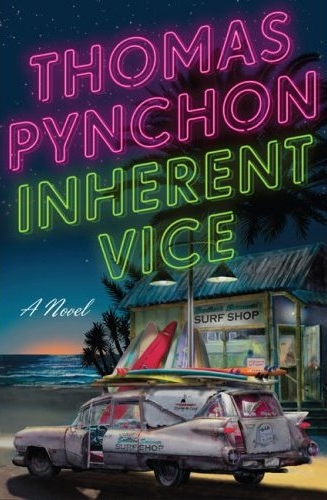I’ve been trying so very hard to read and comprehend at least one book by Thomas Pynchon in the last couple years. His stuff is so intriguing, his style in another universe from most other writers, and his influence is monolithic. So I thought it was criminally negligent and lazy that I’d never read anything of his. It started in 2012 in prison: I tried to read The Crying of Lot 49. I only got about 40 pages in before I had to set it aside. I blame that more on my state of mind and the fact that Health “Care” cut me off ALL medications (I’m disabled with a nerve disorder which causes severe, constant chronic pain). Maybe it wasn’t the right place and time to trudge through the encyclopedic references and density of a Pynchon book.
So I waited until I got out, and eventually tried my hand at what’s considered his greatest masterpiece, the 1974 National Book Award-winner, Gravity’s Rainbow. Nearly 800 pages. Supposedly something like 400 characters. And 70 pages—that’s as far as I got before I was just too confused to continue. Mason & Dixon sounded cool, but it was about the same length, and written in the style of an 18th century British academic. NO THANKS! Finally I read Vineland, and actually managed to finish it, mid-2013. The problem was, most of it flew over my head. Three-fourths of the time, I had no idea what was going on. After that I tried to read his first book, V., and I got 250 pages in, but I just found myself lost, confused. Another set-aside.
That’s why it was so great to finally start reading his 2009 novel, Inherent Vice. It takes place in late 1960s Southern California. That alone gave it a great amount of intrigue—I’m fascinated by the hippie era. And I grew up in SoCal, so that was just icing. This was definitely, by FAR, Thomas Pynchon’s most accessible book. Normally I can’t stand genre fiction; this is definitely a mystery/detective-type book, written in the genre style on purpose; the only thing that saves it from being genre drivel is Pynchon’s writing. It’s crisp and snappy. His style makes even the most prosaic situations—getting stoned and ordering a pizza, say—crackle like a live wire. It’s a pretty humorous book. I laughed out loud numerous times; a difficult thing for any book to achieve. The only real problems I had with the book were its very ties to the genre in which Pynchon is dabbling. Too many characters, and too many of them are unmemorable; I’m getting the feeling that, with Thomas Pynchon, you just have to throw up your hands and let him take you where he might. Score: 60/100.

